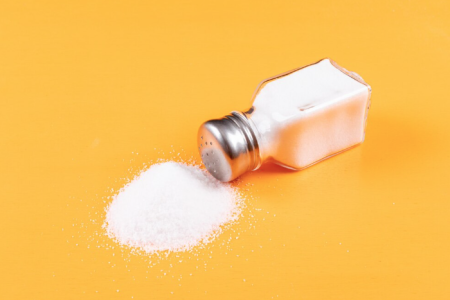Discover the hidden danger in your kitchen: Cancer-causing microplastics discovered in this common ingredient!
By
VanessaC
- Replies 14
The seasoning that graces our dining tables and adds flavour to our favourite dishes may be harbouring a hidden danger.
A recent study has revealed that table salt, a staple in kitchens worldwide, is allegedly contaminated with microplastics, raising concerns about the potential health risks associated with their consumption.
Researchers from Indonesia's Andalas University conducted a comprehensive study on 21 table salt brands.
The results were alarming: every single brand contained microplastics in the form of tiny fragments of plastic, fibres, films, and pellets.
The study detected up to 33 particles per kilogram of table salt.
Given the average salt consumption, this means people could be ingesting more than 1,000 microplastics annually.
Microplastics are tiny pieces of plastic, smaller than five millimetres in length.
They primarily originate from single-use plastics such as bottles and food packaging, which degrade slowly over time.
The study, published in the Global Journal of Environmental Science and Management, explained that 'Salt can be contaminated by water taken from the sea to make the salt, which may contain microplastics, organic matter, and sand particles, as well as during its manufacture.'
The study focused on popular table salt brands purchased in Indonesia.
However, it's worth noting that Indonesia exports most of its sea salt to the US, Singapore, and the Czech Republic, according to global export data company Volza.
The microplastics found in the study appeared in various shapes, sizes, and colours.
'This study successfully identified four different forms of microplastics contained in all 21 salt samples, of which fragments are the most common (67.49 per cent), followed by fibres (23.82 per cent), films (6.08 per cent), and pellets (2.61 per cent) as secondary components,' the study read.
The study also found four types of polymers: polyethylene (34.62 per cent), polypropylene (30.77 per cent), polyethylene terephthalate (15.38 per cent), and polyester (3.85 per cent)
'The morphologies of microplastics show variations across different brands of salt.'
Polyethylene (PE) is a synthetic resin, while polypropylene (PP) is a strong, heat-resistant plastic.
Polyethylene terephthalate (PET), on the other hand, can be found in clothing fibres and containers for liquid and food, while polyester is a man-made fibre material.
The tiny particles also appeared in different colours, such as black, blue, yellow, red, and transparent. However, black was the most dominant colour.
It is understood that the researchers have not shared the brand names of the salt used in the study 'to maintain privacy'.
 Members, what are your thoughts on this latest discovery? Let us know in the comments below!
Members, what are your thoughts on this latest discovery? Let us know in the comments below!
A recent study has revealed that table salt, a staple in kitchens worldwide, is allegedly contaminated with microplastics, raising concerns about the potential health risks associated with their consumption.
Researchers from Indonesia's Andalas University conducted a comprehensive study on 21 table salt brands.
The results were alarming: every single brand contained microplastics in the form of tiny fragments of plastic, fibres, films, and pellets.
The study detected up to 33 particles per kilogram of table salt.
Given the average salt consumption, this means people could be ingesting more than 1,000 microplastics annually.
Microplastics are tiny pieces of plastic, smaller than five millimetres in length.
They primarily originate from single-use plastics such as bottles and food packaging, which degrade slowly over time.
The study, published in the Global Journal of Environmental Science and Management, explained that 'Salt can be contaminated by water taken from the sea to make the salt, which may contain microplastics, organic matter, and sand particles, as well as during its manufacture.'
The study focused on popular table salt brands purchased in Indonesia.
However, it's worth noting that Indonesia exports most of its sea salt to the US, Singapore, and the Czech Republic, according to global export data company Volza.
The microplastics found in the study appeared in various shapes, sizes, and colours.
'This study successfully identified four different forms of microplastics contained in all 21 salt samples, of which fragments are the most common (67.49 per cent), followed by fibres (23.82 per cent), films (6.08 per cent), and pellets (2.61 per cent) as secondary components,' the study read.
The study also found four types of polymers: polyethylene (34.62 per cent), polypropylene (30.77 per cent), polyethylene terephthalate (15.38 per cent), and polyester (3.85 per cent)
'The morphologies of microplastics show variations across different brands of salt.'
Polyethylene (PE) is a synthetic resin, while polypropylene (PP) is a strong, heat-resistant plastic.
Polyethylene terephthalate (PET), on the other hand, can be found in clothing fibres and containers for liquid and food, while polyester is a man-made fibre material.
The tiny particles also appeared in different colours, such as black, blue, yellow, red, and transparent. However, black was the most dominant colour.
It is understood that the researchers have not shared the brand names of the salt used in the study 'to maintain privacy'.
Key Takeaways
- A study has revealed that there are up to 33 microplastics per kilogram of table salt, indicating significant consumption of these particles based on the average salt consumption.
- Researchers at Andalas University in Indonesia sampled 21 table salt brands and discovered tiny fragments of plastic, fibres, films, and pellets.
- The microplastics found in the salt samples come in various forms, with fragments being the most common, and include several polymers such as polyethylene and polypropylene.
- Although the study focused on brands from Indonesia, it raises global concerns since the country exports most of its sea salt, implying that these microplastics could be present in table salt consumed worldwide.








